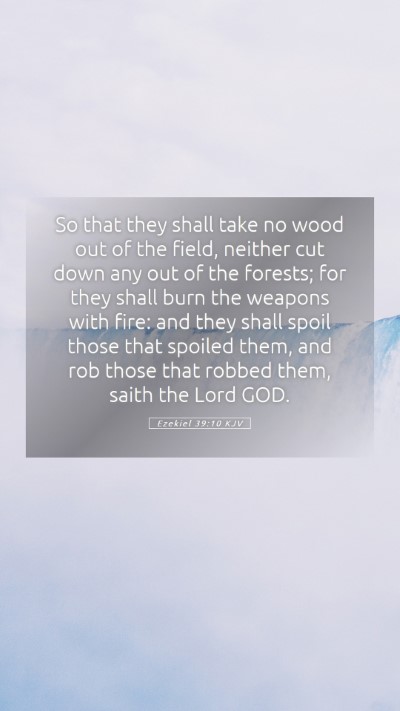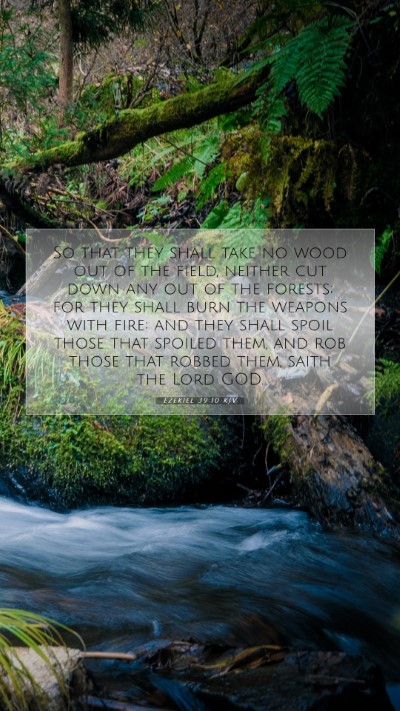Bible Verse Meaning and Commentary on Ezekiel 39:10
Ezekiel 39:10 states: "So they shall take no wood out of the field, neither cut down any out of the forests; for they shall burn the weapons with fire; and they shall spoil those that spoiled them, and rob those that robbed them, saith the Lord God." This verse is part of a prophetic message conveyed by the prophet Ezekiel regarding God's judgment and deliverance of Israel.
Overview of Ezekiel 39:10
In this chapter, the Lord declares the restoration of Israel after a time of judgment and affliction. The context of this verse is essential for understanding its implications. In Ezekiel 39, God speaks of a great battle where He will gather the nations against Israel, but eventually, He will act as a divine warrior, restoring His people and punishing their enemies.
Interpretation Insights from Public Domain Commentaries
-
Matthew Henry's Commentary:
Henry highlights that this verse signifies a time of divine retribution where the weapons used against Israel become fuel for their restoration. The symbolism suggests that the very means by which the enemies sought to destroy God's people will be transformed into a means of sustenance and survival for them, showcasing God's sovereign power.
-
Albert Barnes' Notes on the Bible:
Barnes emphasizes the cessation of traditional means of conflict, like gathering wood, illustrating a time when the need for weapons, and consequently violence, will be abolished. The fire used to burn weapons symbolizes the elimination of hostility and the beginning of peace, where the spoils of war now serve God's purpose in rebuilding His people.
-
Adam Clarke's Commentary:
Clarke interprets the act of burning weapons as a sign of the end of warfare. The phrase 'rob those that robbed them' indicates a reversal of fortunes where the oppressed gain victory over their oppressors, signifying God's promise to vindicate His people and fulfill His covenant with them.
Key Themes and Lessons
-
Divine Vindication:
The promise of restoration emphasizes that God stands with His people during their trials and will ultimately set things right. This serves as a profound reminder for believers that even amidst suffering, God’s sovereignty prevails.
-
God's Sovereignty Over History:
Ezekiel’s prophecy showcases God's control over the fate of nations. His declaration through the prophet offers assurance that He orchestrates history according to His will and purpose, giving hope that justice will prevail.
-
Transformation of Conflict to Peace:
The transformation of weapons into firewood conveys a powerful message about peace and restoration. Believers are encouraged to trust in God’s ability to turn their adversities into opportunities for growth and renewal.
Cross References
- Isaiah 54:17: "No weapon that is formed against thee shall prosper..." - A clear parallel regarding God’s protection and promises for His people.
- Jeremiah 51:20-24: The promise of vengeance against the oppressors of Israel, reinforcing the theme of divine retribution.
- Romans 12:19: "Vengeance is mine; I will repay, saith the Lord." - This New Testament figure reflects the same principle of divine justice and God's role in sanctifying His people.
Application for Today
This verse offers profound insights into how believers can navigate difficult circumstances. It encourages understanding Scripture as a guide for living, trusting that God will ultimately bring justice and restoration. Despite current challenges, believers can find peace in knowing that God has sovereign control over their lives and history, reminding them that the circumstances of today do not define their future. As such, engaging in Bible study groups, utilizing Bible study tools, and seeking deeper Bible study insights can enrich one’s understanding and application of verses like Ezekiel 39:10.
This commentary invites readers into an in-depth analysis of biblical texts, encouraging personal reflection on how to apply the principles derived from God's promises to their daily lives. The meaning of Bible verses such as this invokes a sense of spiritual fortitude and hope for believers as they face their own battles.


